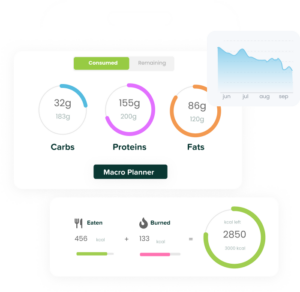Tequila 1800
Quantity
1.5 fluid onces (shot)
How many calories are in Tequila 1800?
Macronutrients
Proteins
Carbs
Fats
100 kcal
Calories
Nutrition facts
Proteins
0g
Carbs
0g
Sugar
0g
Fats
0g
Saturated
0g
Polyunsaturated
0g
Monounsaturated
0g
Trans
0g
Cholesterol
0mg
Sodium
0mg
Potassium
0mg
Fiber
0g
Vitamins
Vitamin A
0mg
Vitamin B1
0mg
Vitamin B2
0mg
Vitamin B3
0mg
Vitamin B6
0mg
Vitamin B9
0mg
Vitamin B12
0mg
Vitamin C
0mg
Vitamin D
0mg
Vitamin E
0mg
Vitamin K
0mg
Minerals
Calcium
0mg
Iron
0mg
Magnesium
0mg
Phosphorous
0mg
What you need to know about calories in Tequila 1800.
Welcome to our in-depth guide on Tequila 1800. In this article, we will dive into the nutritional aspects, macronutrient breakdown, common serving sizes, the various available varieties, and even explore the possibility of a healthier version. Whether you’re a tequila enthusiast or just curious about this renowned spirit, we’ve got you covered.
Nutritional properties of Tequila 1800
Tequila 1800 is distinct not only for its rich taste but also for its unique nutritional properties. It’s low in calories but packed with character. This remarkable spirit offers both positive and negative health impacts. We’ll uncover what makes it special and how it affects your body it you consume one or more shots of tequila.
Macronutrients of Tequila 1800
Tequila 1800, like all spirits, is calorie-dense. We’ll explore why this is and discuss the ingredients used in its production. In this section, we’ll also break down its macronutrient composition. Three sub-sections will cover Proteins, Carbohydrates, and Fats. You’ll learn about their quantities, whether they are at high levels, and their overall impact on your health.
Proteins
Tequila 1800 doesn’t contain significant protein content, but we’ll delve into what it does offer.
Carbohydrates
Discover the carb content in Tequila 1800 and its relevance to your diet.
Fats:
Learn about the fat content in this spirit and whether it’s a concern for your health.
Common Serving Sizes
Tequila 1800 is often enjoyed in various serving sizes. We’ll list the most common ones, from a standard shot to larger measures, and reveal the calories and macronutrients in each. This will help you make informed choices based on your preferred serving size.
Standard
Shot (1.5 fluid ounces or 44 ml):
- Calories: Approximately 100 calories
- Macronutrients:
- Carbohydrates: Negligible
- Proteins: Negligible
- Fats: Negligible
Cocktail (2 fluid ounces or 59 ml):
- Calories: About 128 calories
- Macronutrients:
- Carbohydrates: Minimal
- Proteins: Minimal
- Fats: Minimal
Tequila Sunrise (6 fluid ounces or 177 ml):
- Calories: Around 288 calories
- Macronutrients:
- Carbohydrates: Moderate
- Proteins: Negligible
- Fats: Negligible
Margarita (8 fluid ounces or 237 ml):
- Calories: Approximately 341 calories
- Macronutrients:
- Carbohydrates: Moderate
- Proteins: Minimal
- Fats: Minimal
Pint Glass (16 fluid ounces or 473 ml):
- Calories: About 682 calories
- Macronutrients:
- Carbohydrates: Moderate
- Proteins: Minimal
- Fats: Minimal
Tequila 1800 Bottle (750 ml):
- Calories: Roughly 1,600 calories
- Macronutrients:
- Carbohydrates: Minimal
- Proteins: Minimal
- Fats: Minimal
Variety of Tequila 1800 that you can find
Explore the world of Tequila 1800 through its diverse varieties. We’ll discuss the unique characteristics and peculiarities of each variety. Whether you’re looking for a smooth Reposado or a bold Añejo, you’ll find valuable insights here.
Tequila 1800 Reposado
Learn about the mellow and nuanced flavors of Reposado Tequila 1800.
Tequila 1800 Añejo
Discover the rich and complex world of Añejo Tequila 1800.
Tequila 1800 Blanco
Dive into the crisp and vibrant profile of Blanco Tequila 1800.
Is there a healthier version of Tequila 1800?
While Tequila 1800, like most spirits, doesn’t vary significantly in terms of calories or macronutrients across its different varieties, there are a few factors to consider if you’re looking for a potentially healthier option:
Blanco Tequila: Blanco Tequila, often referred to as white or silver Tequila, is typically the purest form of Tequila as it is unaged. This means it hasn’t spent time in barrels, so it retains its clear appearance. Blanco Tequila tends to have a crisper, more straightforward flavor profile. It generally contains fewer compounds from wood aging, which can sometimes add calories. So, if you’re watching your calorie intake, Blanco Tequila may be a slightly better choice.
Moderation: Ultimately, the key to enjoying Tequila 1800 or any alcoholic beverage in a healthier manner is moderation. Keep your serving sizes in check, as excessive consumption of alcohol can have adverse effects on your health, regardless of the specific variety.
Mixers: Be mindful of what you mix with your Tequila. Using calorie-laden mixers like sugary sodas or high-calorie juices can significantly increase the overall calorie content of your drink. Opting for lighter mixers or even just a splash of lime juice and soda water can help reduce calorie intake.
Lifestyle Choices: Consider your overall lifestyle and dietary choices. If you’re looking to enjoy Tequila 1800 within a balanced and healthy diet, be aware of how it fits into your daily calorie and macronutrient intake.
Remember that while there may be some slight variations in calorie content between Tequila 1800 varieties, the differences are generally minimal, and the key to enjoying it in a healthier way lies in moderation and mindful consumption. Always prioritize your health and make choices that align with your personal wellness goals.
Conclusion
In conclusion, Tequila 1800 is more than just a spirit; it’s a fascinating world of flavors and nutritional nuances. Whether you’re savoring its unique taste or seeking a healthier option, understanding its properties is key. Make informed choices and enjoy the world of Tequila 1800 responsibly.
This comprehensive guide on Tequila 1800 will not only answer your questions but also provide valuable insights into this beloved spirit’s nutritional aspects and varieties.
Other popular foods

